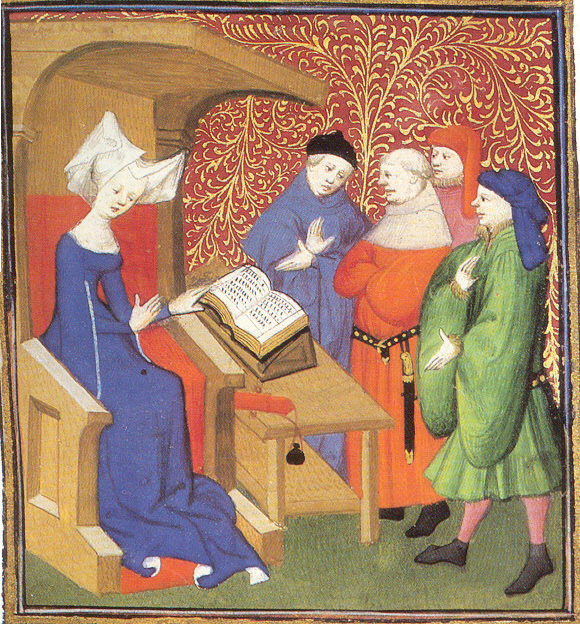
Christine de Pizan
Christine de Pizan or Pisan (French: [kʁistin də pizɑ̃] , Middle French: [krisˈtinə də piˈzã]; born Cristina da Pizzano; September 1364 – c. 1430), was an Italian-born French poet and court writer for King Charles VI of France and several French dukes.
In this medieval Italian name, the name de Pizan is an indicator of birthplace, not a family name.
Christine de Pizan
September 1364
c. 1430 (aged 65–66)
Writer
3
Tommaso di Benvenuto da Pizzano
Christine de Pizan served as a court writer in medieval France after the death of her husband. Christine's patrons included dukes Louis I of Orleans, Philip the Bold of Burgundy, and his son John the Fearless. Considered to be some of the earliest feminist writings, her work includes novels, poetry, and biography, and she also penned literary, historical, philosophical, political, and religious reviews and analyses.[1][2][3] Her best known works are The Book of the City of Ladies and The Treasure of the City of Ladies, both written when she worked for John the Fearless of Burgundy. Her books of advice to princesses, princes, and knights remained in print until the 16th century.
In recent decades, Christine's work has been returned to prominence by the efforts of scholars Charity Cannon Willard, Earl Jeffrey Richards, Suzanne Solente, Mathilde Laigle and Marie-Josephe Pinet.
Personal life[edit]
Christine de Pizan was born in 1364 in the Republic of Venice, Italy. She was the daughter of Tommaso di Benvenuto da Pizzano. Her father became known as Thomas de Pizan, named for the family's origins in the village of Pizzano (currently part of the municipality of Monterenzio), southeast of Bologna. Her father worked as a physician, court astrologer and Councillor of the Republic of Venice.[4] Thomas de Pizan accepted an appointment to the court of Charles V of France as the king's astrologer[5] and in 1368 Christine moved to Paris. In 1379 Christine de Pizan married the notary and royal secretary Etienne du Castel.[6]
She had three children. Her daughter became a nun at the Dominican convent of Poissy in 1397 as a companion to the King's daughter Marie.[7] Christine's husband died of the plague in 1389, a year after her father had died.[6] This left Christine to support her mother and her children.[4] When she tried to collect money from her husband's estate, she faced complicated lawsuits regarding the recovery of salaries still owed to her husband.[8] On 4 June 1389, in a judgment concerning a lawsuit filed against her by the archbishop of Sens and François Chanteprime, councillors of the King, Christine was called "damoiselle" and "widow of Estienne du Castel".[9]